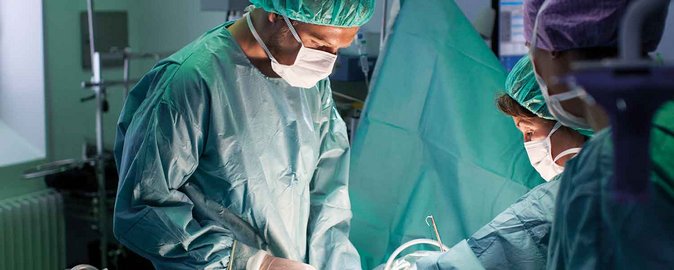- Education
-
Research
Current research
Talent
-
Collaboration
Businesses
Government agencies and institutions
Alumni
-
About AU
Organisation
Job at AU
Aarhus University has strategic focus on solid research-based degree programmes for all students combined with supplementary academic activities and challenges for the most talented and motivated students.
2013.09.10

A Dream Team is selected on he basis of a week-long course for up to twenty-four students. The course introduces the student to laparoscopic surgery, and they are tested at the end of the week. Eight students are invited to join the Dream Team programme, which takes place in the eighth semester. The students on the team are assigned to an experienced surgeon and participate in operations in his or her department at least once a week.
A new pilot project is aimed to give the brightest talents in physics and nanoscience more opportunities for development starting at Bachelor’s degree level. The goal of the project is to establish honours programmes with extra academic activities that will develop and enhance the students’ academic competences.
Vice-dean Tom Vindbæk Madsen is one of the creators of the pilot project. He explains that honours programmes are a necessary response to the increasing size and diversity of the student body.
»Education is the universities’ most important task, and will remain so. The target is for 25 per cent of school-leavers in any one year to complete a long-cycle post-secondary degree. With such a large share of students, we would impose serious limitations on the individual’s ability to develop his or her full potential if all students were forced to complete precisely the same study programme. For this reason, I think that we have to do more to give the brightest talents extra challenges.«
Madsen emphasises that developing talent is no easy task.
»But there’s great potential for society and the university if we’re able to find the right model for developing talent in a more broadly defined sense than before.«
»To my knowledge, there are no programmes like this either in Denmark or run by colleagues abroad.«
The Dream Team programme gives students with a special interest in surgery a chance to begin specialising while still in medical school.
»We can see that students are extremely motivated and even more interested in surgery after participating in the Dream Team programme. For our department, the programme means that the students have a role to play in the operating theatre. We have also been able to draw on their help after the Dream Team programme when we’ve been short a junior doctor to assist. That flexibility is worth its weight in gold for us,« says Mikkel Seyer-Hansen, clinical associate professor at Aarhus University and consultant at Aarhus University Hospital.
Seyer-Hansen explains that complicated operations are becoming more and more commonplace. Examples include endoscopic surgery and complex cancer operations. This development, along with increasing demands with regard to patient safety and the productivity of the healthcare sector, means that better surgical training is necessary.
»Previously, surgeons didn’t start operating on a systematic basis until relatively late. The demands on surgeons have increased in the meantime, which is why it’s important that the surgeons of the future begin receiving training earlier in their careers so that they can develop the necessary skills more quickly. Motivating students to choose surgery as a specialisation early is one of the tools that appears to be working,« says Seyer-Hansen.
Seyer-Hansen’s colleagues at other hospitals are excited about the unorthodox Dream Team concept for medical students.
»It’s a radically different way of training the students. To my knowledge, there are no programmes like this either in Denmark or run by colleagues abroad. And in fact, I’ve been contacted by a number of colleagues and students from around Denmark who are interested in the concept.«
Particularly talented students don’t have to complete their Master’s degree before starting a PhD programme. The flexible PhD programme – an option Aarhus University was the first to offer in Denmark – allows students to enrol in a PhD programme after either three or four years of university study. The so-called 3+5 and 4+4 schemes are a great success, according to Vice-Dean Jes Madsen from the Faculty of Science and Technology.
»The flexible PhD programmes mean that PhD students have more coherence in their study programmes. You work on your PhD project while you’re finishing your Bachelor’s or Master’s, and in this way you experience your studies as a continual progression with a focus on research. Instead of the traditional Master’s thesis, you write a report about the research project you’re working on,« he explains.
All students are free to apply to the flexible PhD programmes, just as some students are encouraged to apply.
»If you know that you want to do research, it’s a major advantage to be able to get started as early as possible. This also means that students figure out where their particular interests lie quickly, and it gives them a chance to become even better at their chosen subject.«
Aarhus University, the first university in Denmark to introduce a flexible doctoral programme that allows students direct admission to a combined Master’s/PhD programme, has a long tradition for researcher talent development. AU is now building on this tradition to strengthen its investment in talent development, and is offering the most talented and motivated students supplementary academic activities at all stages of their studies.
This is a broad talent strategy, in which talent development programmes are focussed on developing sought-after talent for both research and the private and public labour market.